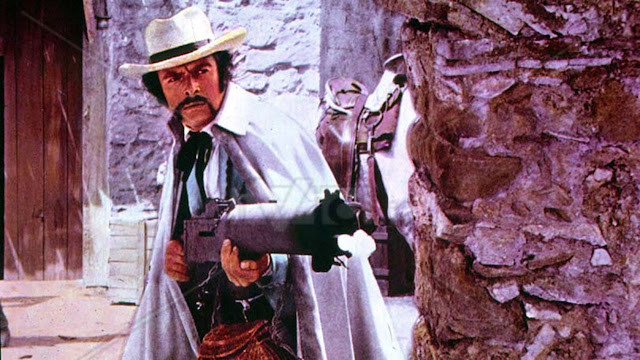Weird Westerns: His Name Was Holy Ghost (1972)
★★☆☆☆
A knockabout Spaghetti Western in which a stranger with a machine gun and vaguely supernatural abilities settles a political feud in a Mexican village.
By Max Sparber
"His Name Was Holy Ghost" is an example of a category of Weird Western I will call the Supernatural Revenger. This are generally stories set in frontier or bordertown communities that have committed some sort of crime, or had some sort of crime committed against them. A mysterious figure appears, exacts revenge, and disappears again, usually having done a few things that are inexplicable to some occult degree.
Clint Eastwood mined this for two films in the 70s, with "High Plains Drifter" and "Pale Rider," but it started with the Italians, really. I don't know what the first example was, but an early contender was 1966's "Django," the hugely influential Sergio Corbucci film in which a drifter dragging a coffin behind him intercedes in a gangland-style war between racists and and Mexican revolutionaries.
"Django" hinted at the supernatural, but later filmmakers would embrace it, and, by the time we get around to "His Name Was Holy Ghost," the supernatural revenger had become almost a cartoon character. The film plays as a sort of daffy sequel to "Companeros," another Corbucci film, this time set in a Mexican town where a corrupt bandit and a pacifist revolutionary are feuding.
"Holy Ghost" takes that essential theme and throws in its title character, a grinning, hugely mustached man in a linen suit and cape who travels with a white dove, played by Gianni Garko. Ostensibly, the Holy Ghost has his own agenda: He carries a damaged map to a mine that he claims he owns, and is looking to collect on it.
Functionally, though, he is in town to eliminate a corrupt military man who had declared himself president and restore the democratically elected president, who has been horrifically abused since he was deposed, along with his supporters.
To this end, the Holy Ghost enlists the aid of a former bruiser named Chicken who has turned to religion, played by Cris Huerta, and they form a sort of Asterix and Obelix, with the latter frequently engaged in great feats of slapstick strength. The resulting film is heavy on jokey scenes of carnage, generally fairly broad, to the irritation of many fans of Spaghetti Westerns. I enjoyed a lot of them, but I am a man of decidedly lowbrow tastes.
The film culminates in a long set piece in a military fort, which the Holy Ghost and Chicken have infiltrated by tagging along with a group of prostitutes — again, borrowed from "Companeros," but with a considerably more chaotic outcome. The last half hour of the film feels like a protracted pie fight, but consisting of prostitutes, google-eyed revolutionaries, soldiers, and bandits all knocking each other about comically.
The Holy Ghost isn't an especially supernatural character, but he does have a rather inexplicable ability to disappear and reappear at will, which is mostly used comically. He is also apparently able to produce a machine gun whenever he needs one, sometimes suddenly pulling one out from under his cape, sometimes just grabbing one that happens to be nearby and opening fire.
These aren't fancy occult skills, but, then, when you're out for revenge, they're all you really need.



Comments
Post a Comment